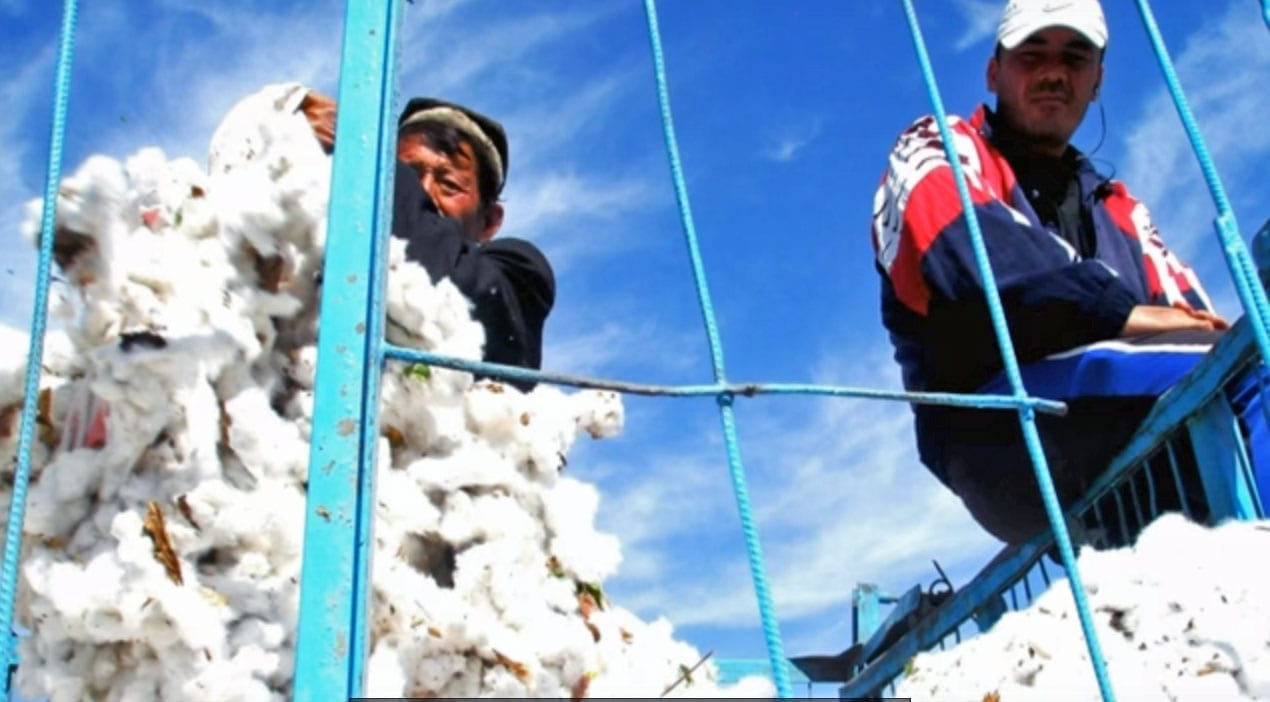
Aug 1, 2016
The World Bank must convey to the Uzbek government that attacks against independent monitors assessing the extent of forced labor in the country’s cotton harvest will not be tolerated. The World Bank must also outline consequences should the attacks continue, according to the Cotton Campaign.
In a July 29 letter to key World Bank officials, the Cotton Campaign, a coalition of dozens of labor and human rights groups that includes the Solidarity Center, wrote:
“The World Bank should take all reasonable measures to create an enabling environment for independent actors to monitor projects that it finances. We have not seen the bank take such measures in Uzbekistan.”
The World Bank Group is providing more than $500 million in financing to the government of Uzbekistan for its agriculture sector and additional financing to multinational companies processing forced-labor cotton in Uzbekistan.
1 Million in Forced Labor During Cotton Harvests
During each fall cotton harvest, the Uzbekistan government forces more than 1 million teachers, nurses and others to pick cotton for weeks, deeply cutting services at schools and medical facilities. Last fall, the government went to extreme measures—including jailing and physically abusing those independently monitoring the process—to cover up its actions.
“The Uzbek government’s repression of human rights monitors has made it impossible for essential mitigation measures of monitoring and grievance redress to function,” according to the coalition, which sent the letter in advance of an early August roundtable meeting of the World Bank, the Uzbek government, the International Labor Organization and diplomatic missions in Uzbekistan.
The coalition also is requesting that the World Bank “obtain an enforceable commitment from the Uzbek government to allow independent journalists, organizations and individuals to have access to all World Bank project-affected areas and to monitor, document and report about forced labor without interference or fear of reprisal.”
Uzbekistan Downgraded in US Trafficking in Persons Report
In June, an Uzbek victim of forced labor in cotton production and three human rights defenders filed a complaint against the World Bank’s private lending arm, the International Finance Corporation (IFC). They seek an investigation into forced labor connected to a $40 million loan to Indorama Kokand Textile, which operates in Uzbekistan. The complaint presents evidence that the loan to expand the company’s cotton manufacturing facilities in Uzbekistan allows it to profit from forced labor and sell illicit goods.
Also in June, Uzbekistan and Turkmenistan, where forced labor in cotton harvests also is rampant, were downgraded to the lowest ranking in the U.S. State Department’s 2016 Trafficking in Persons Report.
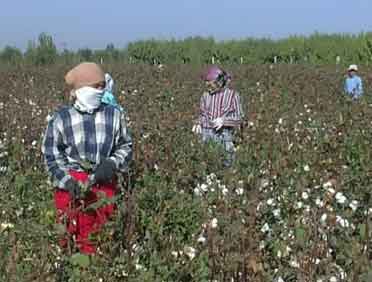
Jul 8, 2016
An Uzbek victim of forced labor in cotton production and three human rights defenders filed a complaint against the World Bank’s private lending arm, the International Finance Corporation (IFC), according to a coalition of human rights groups.
The June 30 complaint seeks an investigation into forced labor connected to a $40 million loan to Indorama Kokand Textile, which operates in Uzbekistan. The forced labor victim, who requested confidentiality, and the rights defenders Dmitry Tikhonov, Elena Urlaeva and a third who requested confidentiality, presented evidence that the loan to expand the company’s cotton manufacturing facilities in Uzbekistan allows it to profit from forced labor and sell illicit goods.
“The IFC should support sustainable rural development in Uzbekistan, not projects that perpetuate the government’s forced-labor system for cotton production,” says Tikhonov, who lives is in exile in France following possible retaliation—including the burning of his home—for his efforts to document forced labor in Uzbekistan.
“The ombudsman should investigate the IFC loan to Indorama, which we believe violates international law and the IFC’s own policies prohibiting forced labor.” The Cotton Campaign, the Uzbek-German Forum for Human Rights, the International Labor Rights Forum, and Human Rights Watch jointly announced the complaint.
1 Million in Forced Labor Each Year
Each year, the Uzbek government, which controls all of the country’s cotton production and sales, forces more than 1 million teachers, nurses and others to pick cotton for weeks. Last year, the government went to extreme measures—including jailing and physically abusing researchers independently monitoring the process—to cover up its actions.
Uzbekistan was downgraded to the lowest ranking in the U.S. State Department’s annual Trafficking in Persons report which was released last month.
The World Bank has invested more than $500 million in Uzbekistan’s agricultural sector. Following a complaint from Uzbek civil society, the bank attached loan covenants stipulating that the loans could be stopped and subject to repayment if forced or child labor was detected in project areas by monitors from the International Labor Organization (ILO), contracted by the World Bank to carry out labor monitoring during the harvest.
The World Bank approved the loan to Indorama in December 2015, despite an ILO report reaffirming the problem of forced labor.
In March, Cotton Campaign, a coalition of labor and human rights groups that includes the Solidarity Center, presented a petition signed by more than 140,000 people from around the world to World Bank President Dr. Jim Yong Kim, calling on the bank to suspend lending to the agriculture sector in Uzbekistan until the Uzbek government changes its policy of forced labor in the cotton industry.
Read the complaint here.
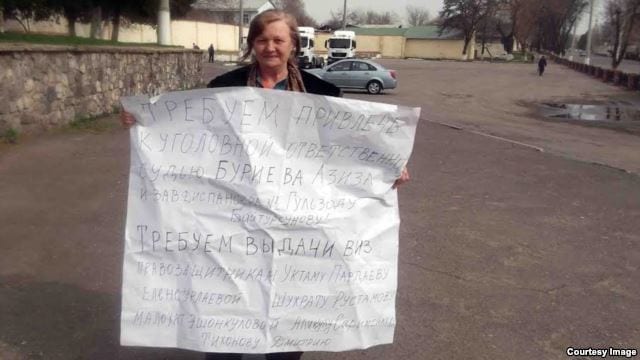
Jun 6, 2016
Uzbek human rights defender Elena Urlaeva was released last week from a psychiatric hospital in Tashkent where she was detained against her will for more than a month, according to the Cotton Campaign, a coalition of worker rights and human rights groups that includes the Solidarity Center.
While expressing relief at Urlaeva’s release, Umida Niyazova, director of the Uzbek-German Human Rights Forum says, “We continue to be alarmed at the heightened repression campaign the Uzbek government is carrying out against those who monitor forced labor in the cotton harvest.”
For 16 years, Urlaeva has documented forced labor in Uzbekistan’s cotton fields, where some 1 million teachers, medical professionals and others are forced to toil during harvest seasons. She has been credited with helping significantly reduce child labor in cotton fields, and this year was among human rights defenders in Uzbekistan to receive the International Labor Rights Forum 2016 Labor Rights Defenders Award.
Urlaeva was arrested five times last year as she spoke with those forced by the government to labor in the country’s cotton fields, and says that she was physically assaulted during the subsequent interrogation.
Uzbek Government Crackdown on Human Rights Activists
The International Labor Organization (ILO) has pushed the Uzbek government to end forced labor. Following a complaint by Uzbek civil society, the World Bank attached covenants stipulating its loans to Uzbekistan could be stopped and subject to repayment if forced or child labor was detected in project areas by ILO monitors contracted by the World Bank to carry out labor monitoring during the harvest. In March, members of the Cotton Campaign urged the World Bank to make good on its promise.
The Uzbek government has responded to global pressure to end forced labor by cracking down on Uzbek labor rights activists who monitor cotton harvests.
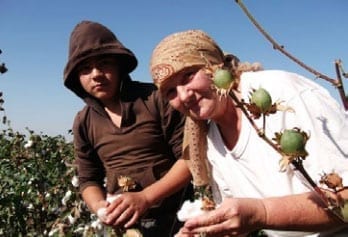
May 20, 2016
Uzbek human rights defender Elena Urlaeva has been detained against her will in a psychiatric hospital in Tashkent and the government should release her immediately, the Cotton Campaign said today. The Cotton Campaign is a coalition of worker rights and human rights groups that includes the Solidarity Center.
“Holding Elena Urlaeva in a psychiatric hospital without a clear medical rationale is a grave breach of medical ethics,” says Umida Niyazova, director of the Uzbek-German Forum for Human Rights (UGF). “She should be released immediately, and the Uzbek government must cease using hospitals as extrajudicial detention centers.”
Urlaeva’s Efforts Key to Reducing Child Labor
Urlaeva for years has documented forced labor in Uzbekistan’s cotton fields, where some 1 million teachers, medical professionals and others are forced to toil during harvest seasons. She has been credited with helping significantly reduce child labor in cotton fields, and this month was among human rights defenders in Uzbekistan to receive the International Labor Rights Forum 2016 Labor Rights Defenders Award.
Urlaeva was detained last year after interviewing and photographing teachers forced by government officials to work in the cotton fields, and says that she was physically assaulted during the subsequent interrogation.
The International Labor Organization (ILO) has pushed the Uzbek government to end forced labor. Following a complaint by Uzbek civil society, the World Bank attached covenants stipulating its loans to Uzbekistan could be stopped and subject to repayment if forced or child labor was detected in project areas by ILO monitors contracted by the World Bank to carry out labor monitoring during the harvest. In March, members of the Cotton Campaign urged the World Bank to make good on its promise.
Uzbek Government Targets Human Rights Defenders
The Uzbek government has responded to global pressure to end forced labor by cracking down on Uzbek labor rights activists who monitor cotton harvests.
Uktam Pardaev, another Uzbek labor rights activist was jailed while he was monitoring last fall’s cotton harvest in Uzbekistan and now is serving three years’ probation at his home, where he is under constant surveillance by security services. (You can take action to help Pardaev.)
Also last fall, Uzbek human rights defender Dimitry Tikhonov reported that his home office was burned and all the equipment and documentation he collected on Uzbekistan’s use of forced labor in the country’s cotton harvestsm destroyed. No other room in his home was touched by the fire, he said. Tikhonov also was arrested and beaten by police as he took photos of some 20 busloads of teachers and school employees forced into the cotton fields for the annual harvest. Tikhonov has since fled the country.
The stories of all three Uzbek human rights defenders are featured in a video created as part of the Labor Rights Defenders Award ceremony, in which a voice-over points out that “the Uzbek government treats them as enemies of the state because of their peaceful human rights activities.”
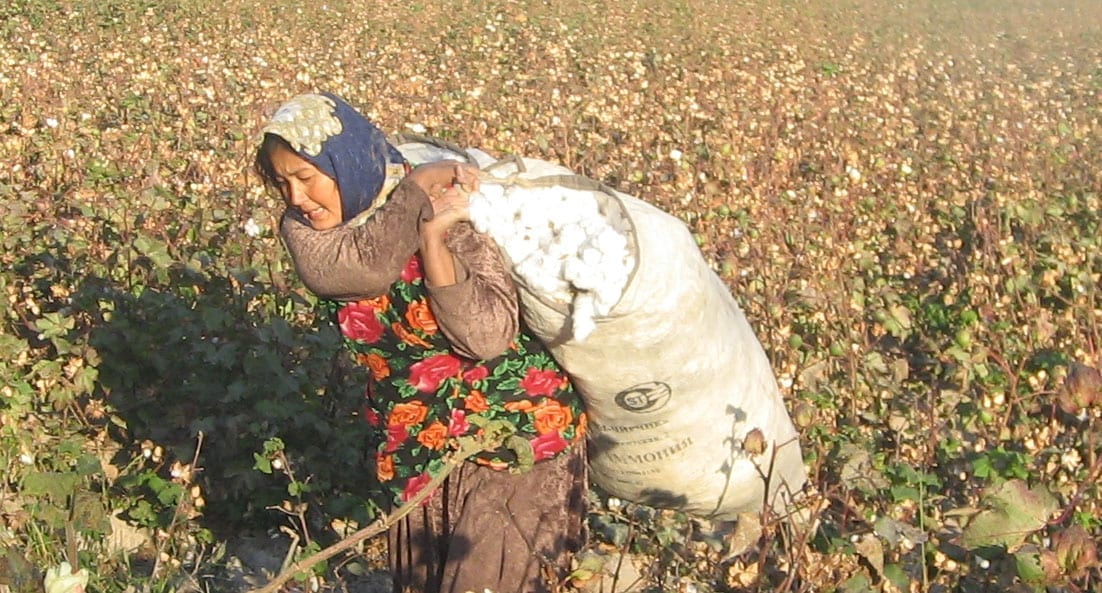
May 3, 2016
A global union campaign is calling on the Uzbek government to reverse its conviction of Uzbek human rights activist Uktam Pardaev, who was sentenced to three years’ probation in January and is under constant surveillance by security services at his home. Officials also continue to harass Uktam Pardaev’s relatives and friends, who have been watched, questioned and threatened, according to global union and human rights groups.
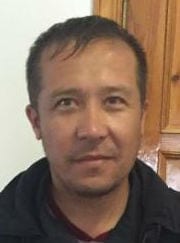
Human rights activist Uktam Pardaev was jailed while he was monitoring last fall’s cotton harvest in Uzbekistan. Credit: IUF
ardaev, a member of an independent cotton harvest monitoring group, was arrested in November 2015 on trumped-up charges of fraud and taking a bribe. He was held for eight weeks in pre-trial detention, where he was locked in a damp, cold cell with only a dirty mat to sleep on and little food. Pardaev says he witnessed officials torturing and mistreating detainees to coerce confessions and was beaten severely on one occasion.
Pardaev was among human rights activists monitoring last fall’s cotton harvest in Uzbekistan, where more than 1 million teachers, nurses and others are forced to pick cotton for weeks each harvest season. A report released in March documented how the government took extreme measures to cover up its actions last fall, jailing and physically abused those independently monitoring the process.
“The government unleashed an unprecedented campaign of harassment and persecution against independent monitors to attempt to cover up its use of forced labor while taking pains to make widespread, massive forced mobilization appear voluntary,” according to The Cover-Up: Whitewashing Uzbekistan’s White Gold.
Uzbekistan, which gets an estimated $1 billion per year in revenue from cotton sales, faced high penalties for not addressing its ongoing forced labor. But rather than end the practice, the government sought to cover it up, according to the report, produced by the Uzbek-German Forum for Human Rights.
Take action now and send a message of support calling on the Uzbek government to reverse Pardaev’s conviction; conduct a prompt, independent, and impartial investigation into his credible allegations of ill-treatment by prison officials; and bring those responsible






